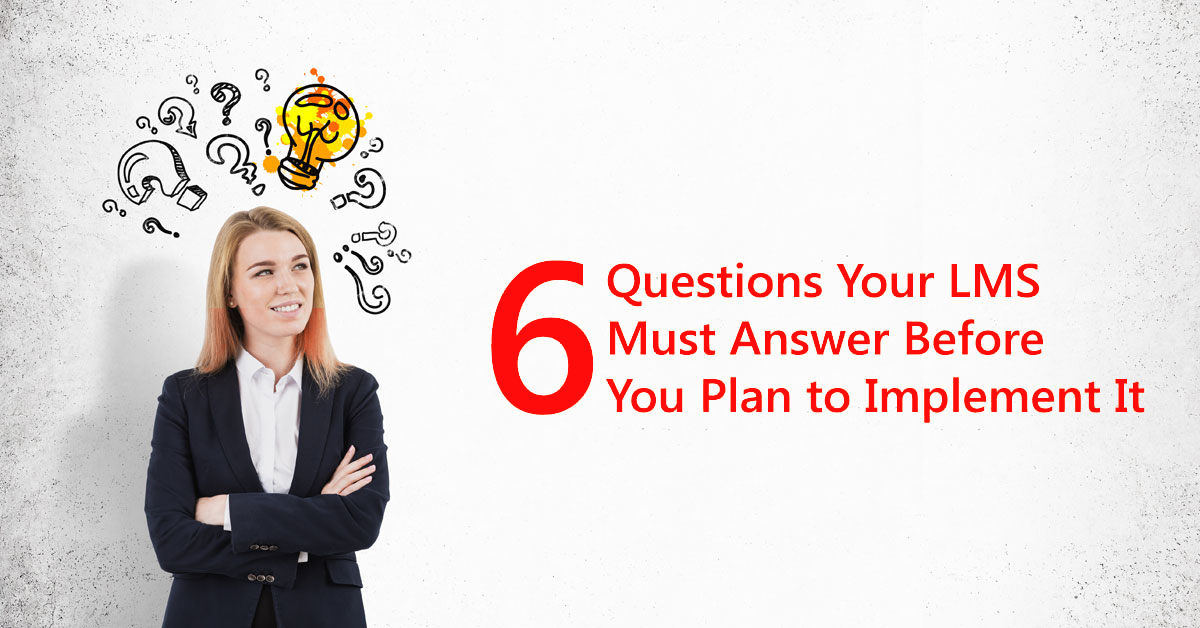In today’s time, when most corporate organizations and training companies are opting for eLearning, it is crucial to have an LMS that suits your business requirements.
An LMS is required to serve employees, channels, and partners who are undoubtedly the most valuable assets of an organization. Not having a concrete training program designed to suit the growing learning and development demands would hamper the value and productivity of employees. Hence, you must plan to implement an LMS that is well suited to your business requirements, both, current and upcoming.
So, before you plan to implement an LMS, here are six important questions that your LMS must answer in order to ensure you pick the right one for your organization.
-
On this Page
Why do you need an LMS?

Define the objective of buying an LMS for your organization. You need to have a specific purpose defined for the LMS to serve with regards to your organization’s goals. Be specific and solution-oriented to the ‘need’ for an LMS. You may consider defining the business challenges first and then find out if the LMS can help you solve it.
A few things you may consider here:
- Does your workforce need training on using a particular product?
- Do you want to provide your workforce with easy access to training content, anytime, anywhere?
- Do you look at generating new leads and acquiring new customers by widely sharing new product features?
- Do you plan to keep your partners and employees updated with the new policies and procedures in the organization through a training course?
-
Which part of the user lifecycle will the LMS impact the most?

Having an in-depth understanding of your target audience and where they stand in the sales funnel is a must. You may want to answer questions like:
- Do you need an LMS to reach out to your audience to make them aware of your product?
- Do you need a training program to speed up the onboarding or induction process in your organization?
- Do you need a tool to retain employees by offering them regular training courses to ensure on-the-job satisfaction among employees?
Irrespective of what might be your challenge, the LMS must guide your audience as they go about using it.
-
What success metrics do you want to measure through the LMS?

Define the metrics that can indicate you are reaching the stated targets. These can be:
- More customer base: Will there be an increase in the customer base through an LMS?
- Quicker onboarding: Will users save time with the onboarding process through an LMS?
- Better retention: Will your workforce utilize the training frequently and thereby be satisfied with their on-the-job training?
- Higher revenues: Will training programs help your employees generate higher revenues for your organization?
An LMS not only helps you figure out the number of employees who have completed their training but also evaluates the impact it has had on the overall defined business objective. So, you may also give it a deeper thought while you choose an LMS.
-
What features do you really need?

Almost all LMSes offer a stack of features. While most LMSes will attract you with some unique features, there remain some must-have features. Hence, you must also know the features you need. Would you be willing to pay for a set of features where not all of them would be of help to you? Make sure your LMS has certain must-have features that are important for your organization’s specific needs.
Here are a few questions that you must ask:
- What are the must-have features your training program needs?
- Can you incorporate multiple media formats in your LMS?
- Does the LMS offer you e-commerce benefits to help you sell your courses online (if you wish to sell your training courses online)?
- Is the LMS compliant with industry standards?
Based on these questions, you will be able to build your feature checklist for the right LMS that is aligned to your business objectives.
-
What is the skill level required for LMS administrators?

It is important to know the skill level of your internal team which will administer the LMS functions. You may want to find out their technical expertise. In case they are not so skilled, will the LMS be perceptive enough for your team to easily upload information, execute training, and extract reports?
Does the LMS offer customer support to resolve queries at any point in time? It is important to have a knowledgeable person to provide the necessary support to your team.
FREE TRIALS? Yes! If you are getting a free demo of the LMS, do take advantage of this. No better way to find out how user-friendly the LMS is!
-
How do you measure ROI?

For any investment, the bottom line remains—ROI. So,how do you measure ROI when you buy an LMS?
The right LMS for your business will result in benefits such as a more efficient workforce, engaged customers, trained partners, reduced costs, and improved productivity, thereby resulting in reduced turnover costs, and an increase in overall business revenues. Smooth internal/external operations and reduced dependencies are added advantages of having the right LMS that funnels down to the bottom line.
We hope that these questions will help you buy the right LMS for your organization! In our next blog, we’ll be sharing a few tips on how you can implement an LMS successfully.
